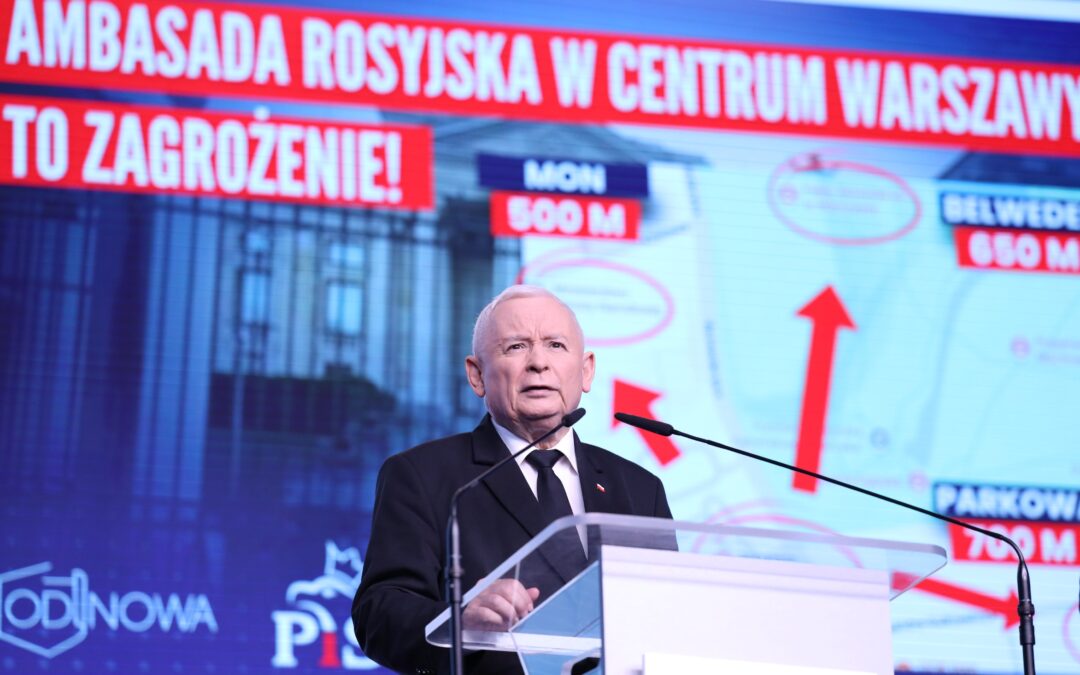Keep our news free from ads and paywalls by making a donation to support our work!

Notes from Poland is run by a small editorial team and is published by an independent, non-profit foundation that is funded through donations from our readers. We cannot do what we do without your support.
Poland’s main opposition party, the national-conservative Law and Justice (PiS), has submitted a resolution to parliament calling on the government to change the location of Russia’s embassy in Warsaw.
PiS argues that the current site – which was established when Poland was under Soviet-backed communist rule – is a symbol of former Russian dominance but that its proximity to important state offices makes it a security threat.
🔴 Projekt uchwały ws. przeniesienia ambasady Rosji w Warszawie 👇 Przeczytaj i podaj dalej! pic.twitter.com/vUGQONf3IU
— Prawo i Sprawiedliwość (@pisorgpl) September 17, 2025
At a press conference on Wednesday, PiS leader Jarosław Kaczyński noted that the Russian embassy is located in what had once been the gardens of the Polish defence ministry, which remains only around 500 metres away.
The embassy is also around 650 metres away from Belweder palace, a presidential residence, and not far from the prime minister’s chancellery.
“Now is the appropriate moment to end this abnormal situation,” declared Kaczyński, who announced the plans on the anniversary of the Soviet Union’s invasion of Poland on 17 September 1939.
“We are taking up this important matter for our security, because there is a very serious threat, and it also has a very symbolic dimension,” he added, speaking one week after multiple Russian drones encroached on Polish airspace.
Speaking alongside Kaczyński, the head of PiS’s parliamentary caucus, Mariusz Błaszczak, who previously served as defence minister, said that it was vital to “change the location of the Russian embassy for counterintelligence protection reasons”.
Marcin Ociepa, the deputy head of the caucus, said that the Soviets had chosen this location so that the embassy would act as a “de facto governor’s palace, intended to loom over Warsaw and state institutions”.
“Now is the moment to tie up Poland’s efforts to regain full sovereignty” by “finally ensuring that this embassy disappears from that place”, where it is used to “conduct activities that harm the interests of Poland”, he added.
Poland has announced the closure of Russia's consulate in Kraków in response to evidence Moscow was behind the fire that destroyed Warsaw's largest shopping centre.
It is the second Russian consulate closed as retaliation for Moscow's sabotage campaign https://t.co/p77JEhNn7u
— Notes from Poland 🇵🇱 (@notesfrompoland) May 12, 2025
Kaczyński noted that only the government can make the decision on changing the embassy’s location. But PiS hopes that, if its resolution receives cross-party support, it will push the government to act.
PiS was itself in government between 2015 and 2023, during which time it did not seek to move the Russian embassy.
The current government, a broad coalition ranging from left to centre-right led by Prime Minister Donald Tusk, has over the last year ordered the closure of Russia’s consulates in the cities of Poznań and Kraków in response to Moscow’s campaign of sabotage in Poland.
In 2022, the municipal authorities in Warsaw seized a former Russian diplomatic compound – nicknamed “Spyville” (Szpiegowo) by locals – and earlier this year announced plans to turn it into housing for public servants.
Warsaw has announced it will renovate a former Russian diplomatic compound known as “Spyville” and turn it into flats for public servants.
The city had hoped to hand it over to the Ukrainian community but could not owing to the building's poor conditionhttps://t.co/J9438EMMFK
— Notes from Poland 🇵🇱 (@notesfrompoland) January 21, 2025

Notes from Poland is run by a small editorial team and published by an independent, non-profit foundation that is funded through donations from our readers. We cannot do what we do without your support.
Main image credit: pisorgpl/X

Daniel Tilles is editor-in-chief of Notes from Poland. He has written on Polish affairs for a wide range of publications, including Foreign Policy, POLITICO Europe, EUobserver and Dziennik Gazeta Prawna.



















